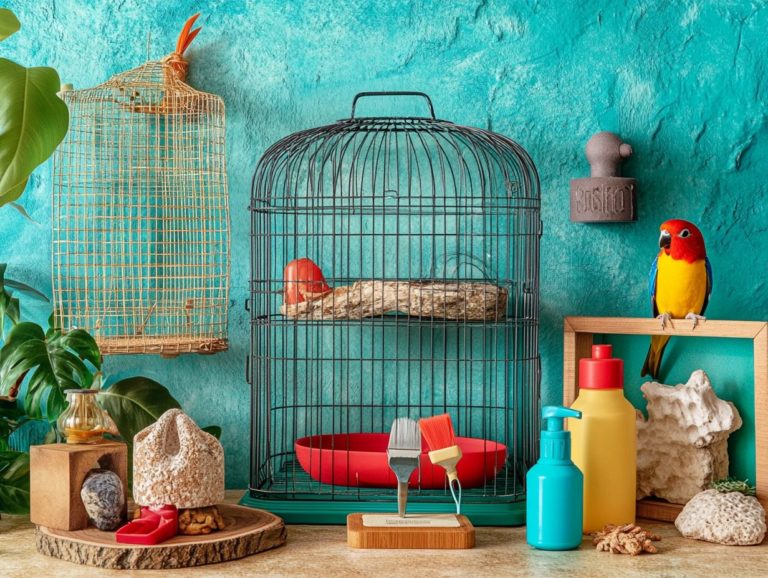Cockatiel Care: Essential Tips for Happy Birds
Bringing a cockatiel into your home is a delightful experience and a significant commitment. This guide has everything you need to create a perfect environment for your feathered friend.
You will discover vital health care practices, effective training techniques, and how to build a strong bond with your cockatiel. Dive in and uncover the secrets to keeping your bird happy and healthy for years to come!
Contents
Key Takeaways:
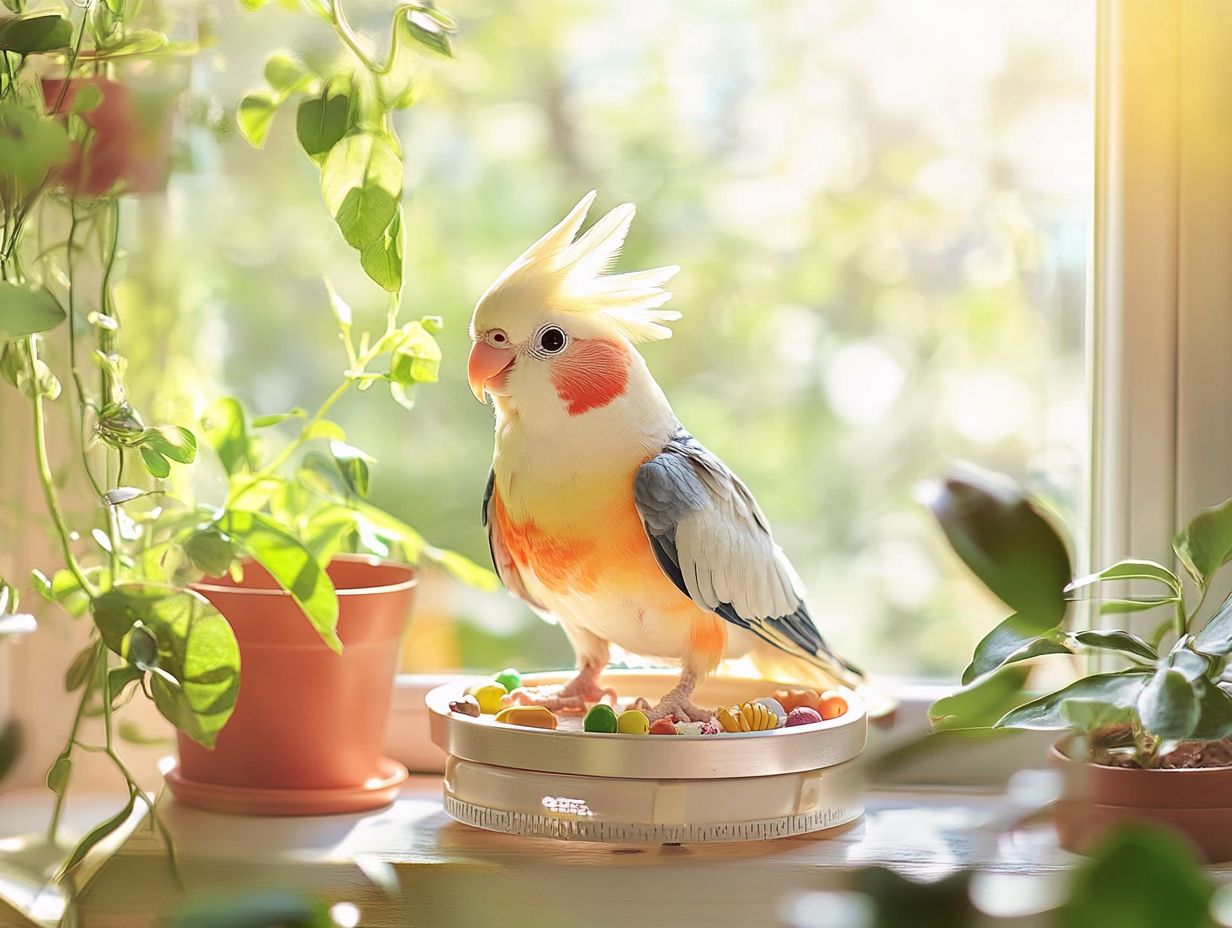
- Provide a spacious, safe, and stimulating environment for your cockatiel.
- Regular vet check-ups and a balanced diet are crucial for their health.
- Understand their behavior and use positive reinforcement to bond with them.
Understanding the Basics
Knowing the essentials of cockatiel care is vital for pet parents eager to create a nurturing space. Proper care means establishing a daily routine that includes feeding, health, hygiene, mental stimulation, and what to feed for optimal health.
This knowledge ensures your cockatiel flourishes in a secure environment, but for those considering a Quaker parrot, it’s also important to explore unique care tips for a unique bird, enhancing both their physical health and emotional well-being.
Creating the Right Environment
Setting up the ideal environment for your cockatiel is essential to their happiness. It requires careful consideration of habitat size and cage accessories, along with following essential care guidelines for adopted cockatoos.
Make the living area bird-proof and free from toxic substances. This maintains their safety and creates a vibrant atmosphere for your feathered companion.
Choosing the Right Cage and Accessories
Selecting the right cage and accessories involves considering size and variety. Ensure the cage is escape-proof and has suitable accessories to enhance your bird’s quality of life.
The cage dimensions must allow for ample movement; a cramped space can lead to stress and health issues. Diverse perches like natural wood, rope, and platform styles not only provide comfort but also encourage exercise.
Incorporate toys, swings, and foraging items to enrich the habitat, making it engaging for your cockatiel. Ensure the cage is made from durable materials with secure locks for safety.
Providing Proper Nutrition
Proper nutrition is crucial for your cockatiel’s health. For those considering other bird species, such as Eclectus parrots, it’s important to follow specific guidelines, including care requirements and tips that encompass fresh food, dietary needs, and balanced nutrition.
Variety is key! Fresh fruits like apples, bananas, and berries are delightful snacks, while veggies like carrots, spinach, and kale provide essential vitamins.
Include high-quality pellets designed for cockatiels to ensure balanced nutrition. Gradual exposure to new foods helps your bird adjust and identify any preferences.
Remember, moderation is vital; treats should complement a well-rounded meal plan rather than replace core foods.
Keeping Your Cockatiel Healthy
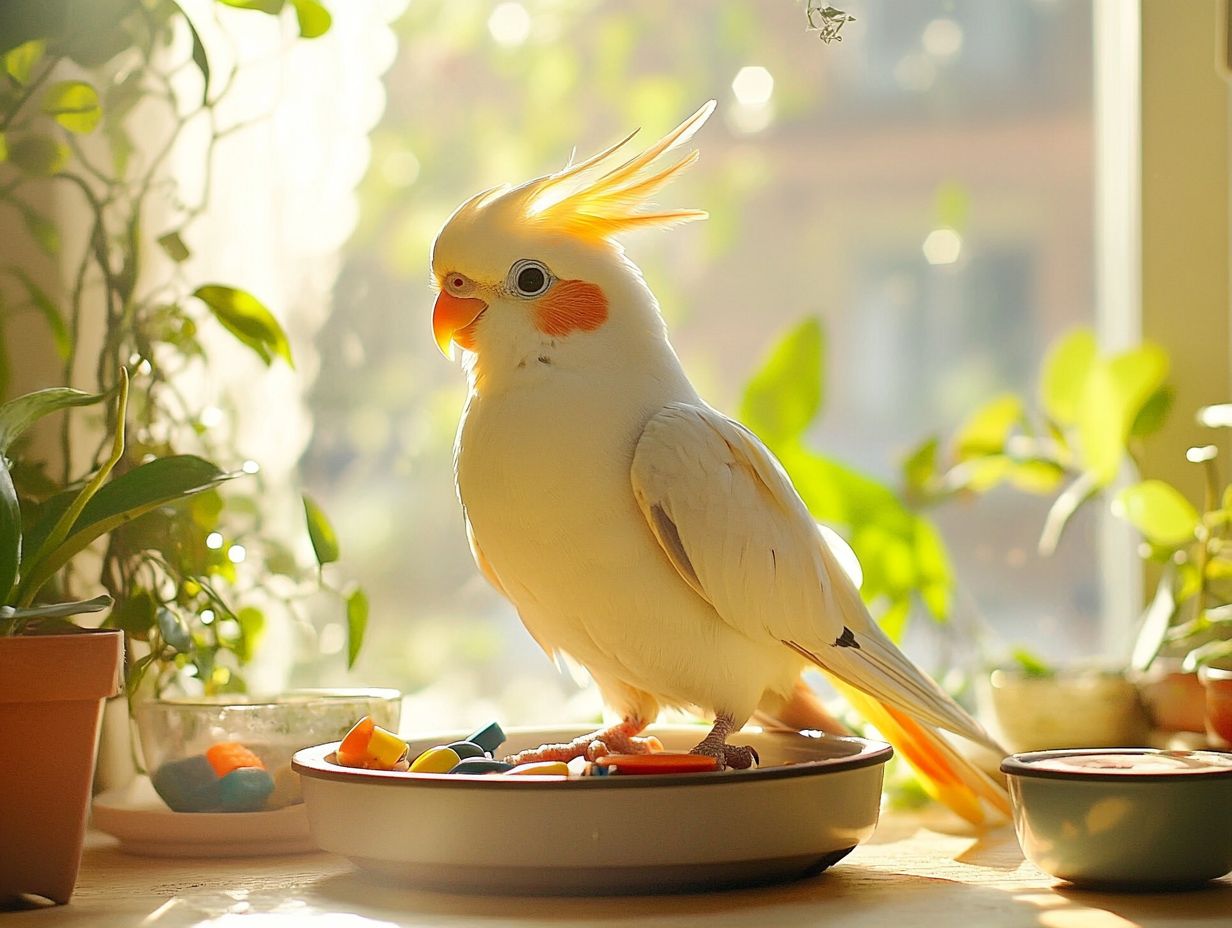
Maintaining your cockatiel’s health requires a comprehensive approach that encompasses regular hygiene practices, timely veterinary visits, and essential care for aging cockatoos through consistent wellness checks.
As a devoted pet parent, you must stay informed about common health issues and recognize the signs of potential health problems. This awareness enables you to deliver effective care and intervene when necessary, ensuring your feathered friend remains vibrant and happy.
Regular Vet Check-Ups and Grooming
Regular vet check-ups and grooming are essential for ensuring your cockatiel’s health. These practices help prevent issues like respiratory infections and contribute to your bird’s overall well-being. By consulting with a bird doctor and following effective grooming tips, you can keep your feathered friend healthy and comfortable, making grooming supplies a key part of your care routine.
Routine vet visits help detect illnesses early. They also provide insights into your cockatiel’s diet and habitat setup both crucial for enhancing your cockatiel’s quality of life.
Grooming is also important; it includes regular beak trimming, nail clipping, and feather care, all of which can prevent discomfort and health complications.
Here are essential grooming supplies to consider:
- A quality nail clipper
- A calcium beak stone for wear
- Natural bird-safe shampoos for occasional washes
A well-groomed cockatiel will thrive in its environment, leading to reduced stress and a much happier pet overall. To ensure their well-being, consider following preventative care tips for your pet bird.
Common Health Concerns and How to Address Them
Being aware of common health concerns for cockatiels, such as respiratory infections, is essential for any devoted pet parent. Recognizing the signs of health issues early can prompt timely vet visits and effective treatment, ensuring your feathered friend stays healthy and happy.
Be aware of issues like feather plucking, nutritional deficiencies, and gastrointestinal problems, which are quite prevalent among these charming birds. Symptoms such as lethargy, changes in appetite, or unusual droppings often signal a deeper issue. It s crucial for you to monitor your cockatiels closely; early detection of these signs can significantly impact the effectiveness of treatment.
For instance, a sudden drop in energy levels or excessive beak grinding may require immediate veterinary attention. By prioritizing regular check-ups, you not only catch potential health issues early but also gain a better understanding of your bird s nutritional needs and overall well-being.
Behavior and Training Tips
Understanding your cockatiel’s behavior is crucial for effective training and creating a harmonious home environment. By incorporating training sessions that prioritize mental stimulation and social interaction, you can develop bonding techniques that strengthen your relationship with your bird and ensure a fulfilling life together.
Understanding Cockatiel Behavior
Understanding cockatiel behavior is essential for nurturing social interaction and maintaining their mental acuity. By recognizing their natural instincts and behavioral patterns, you can employ effective training techniques that enhance your bird’s well-being and deepen the bond between you.
Cockatiels are inherently social creatures, instinctively forming flocks with their peers in the wild to ensure safety and companionship. Observing their interactions with one another reveals valuable insights into their need for engagement and connection.
Implementing training methods, such as clicker training a method that uses a sound to mark desired behaviors not only stimulates their cognitive abilities but boosts their confidence. Positive reinforcement techniques encourage your cockatiel to explore new behaviors, creating a more interactive and enriching environment.
By recognizing cues of stress or boredom, you can tailor your interactions, ensuring that each cockatiel thrives both mentally and emotionally.
Training Techniques for a Happy Bird
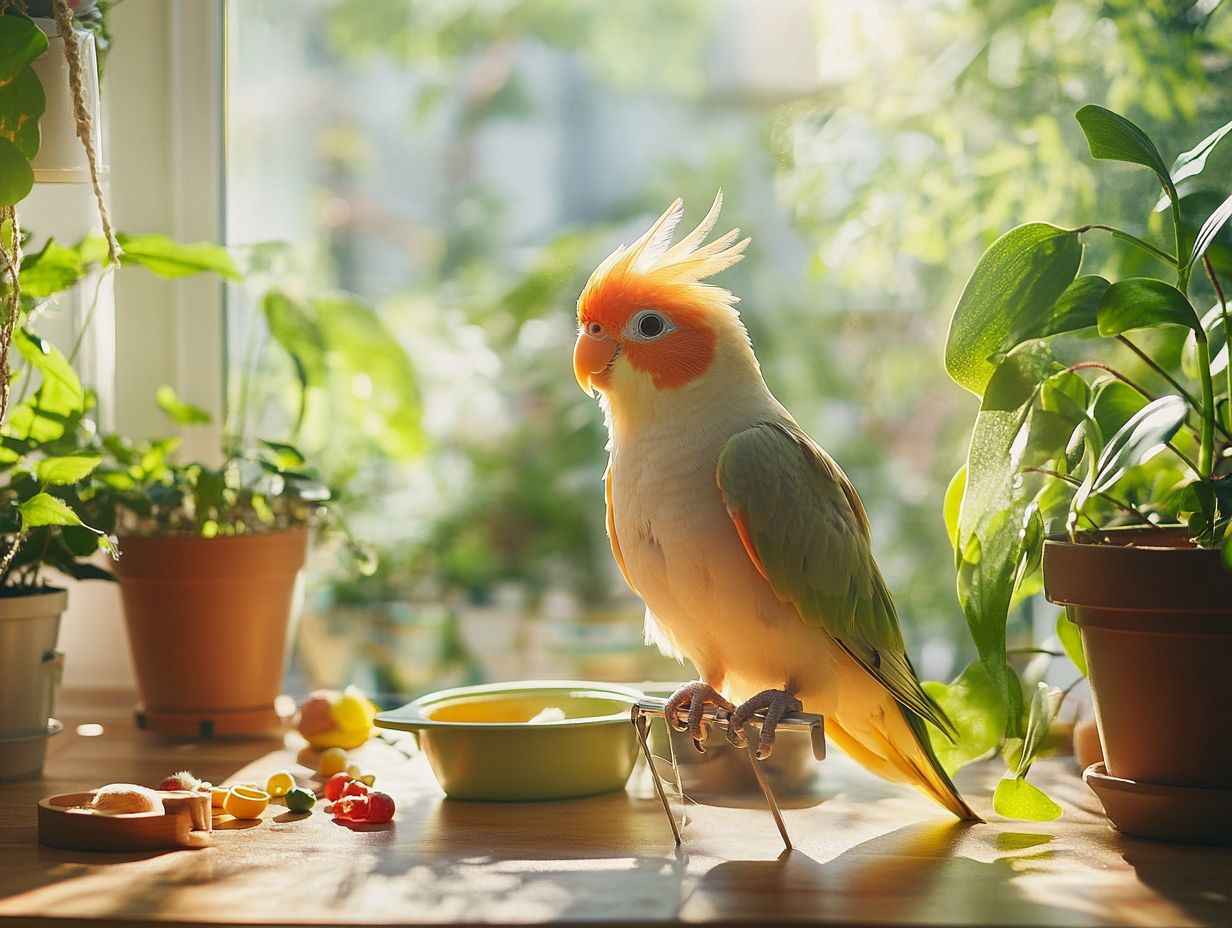
Utilizing effective training techniques is essential for ensuring your cockatiel remains happy and well-adjusted. Interactive toys and engaging playtime activities create enriching experiences that not only entertain but also stimulate your bird’s mind. By incorporating ways to connect with your bird, you can build a trusting relationship that enhances your pet s overall happiness and mental well-being.
These approaches also promote physical activity and boost mental agility. Transform ordinary playtime into purposeful training sessions by introducing toys that involve problem-solving or puzzle elements. This can significantly enhance your cockatiel’s thinking skills while keeping them engaged.
Schedule regular playtime to boost your bond with your bird and keep them happy! Allow your feathered friend to safely explore its environment. Establishing a routine not only provides structure but also instills a sense of security, helping your bird feel more at ease in its surroundings. Ultimately, these strategies can greatly enhance both training outcomes and the quality of life for your charming companion.
Building a Bond with Your Cockatiel
Building a bond with your cockatiel is a rewarding journey that requires consistent effort and deep understanding. By using effective bonding techniques and socialization methods during your daily interactions, you foster trust and companionship.
This thoughtful approach ensures a long-term commitment to your bird’s happiness and well-being.
Creating a Strong Relationship
Creating a strong relationship with your cockatiel relies on bonding techniques that promote social interaction. By integrating these methods into your daily routine, you can establish a foundation of trust and companionship that enriches both your lives.
One essential technique is consistent, gentle handling, which helps your feathered friend feel secure and connected. Engaging regularly with your pet through soft talking can soothe and reassure them. Offering treats during these moments fosters positive reinforcement. Additionally, providing a lovebird lifestyle that allows your cockatiel to observe family activities ensures they feel included, reinforcing their status as a cherished family member.
This gradual integration, along with play sessions and stimulating toys, nurtures a deeper bond and sparks your cockatiel’s natural curiosity. By prioritizing these strategies, you can create an enriching environment that deepens your relationship and enhances the overall well-being of your avian companion.
Frequently Asked Questions
How can I keep my cockatiel happy and thriving?
1. Provide a spacious cage with plenty of toys and perches for your cockatiel to play on and explore, while also considering cockatoo socialization tips for success for enhanced interaction.
2. Offer a varied, nutritious diet consisting of pellets, fresh fruits and vegetables, and occasional treats.
3. Ensure daily exercise and playtime outside of the cage.
4. Provide a shallow dish of water for your cockatiel to bathe in, as they enjoy keeping their feathers clean.
5. Spend quality time with your cockatiel every day; they are social birds and thrive on interaction with their owners.
6. Keep the cage and surrounding area clean and free of any potential hazards, such as toxic plants or loose wires.
How often should I clean my cockatiel’s cage?
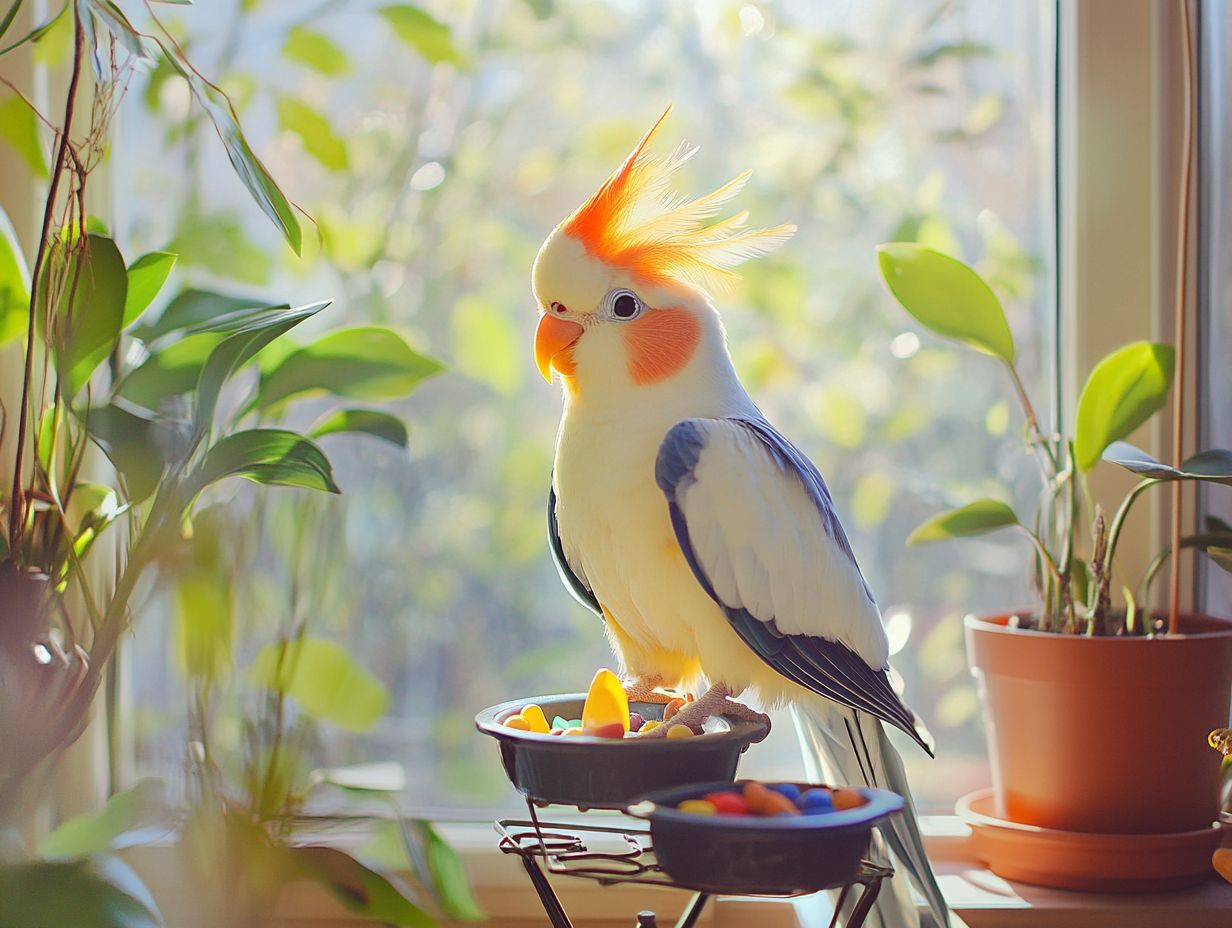
It is recommended to clean your cockatiel’s cage at least once a week, but spot cleaning should be done daily. This includes removing soiled bedding, uneaten food, and droppings. A thorough cleaning with soap and water should be done weekly to ensure a clean and healthy environment for your bird.
What should I do if my cockatiel seems sick or injured?
If you notice any changes in your cockatiel’s behavior or appearance that may indicate illness or injury, it’s important to take them to a veterinarian who specializes in birds. Cockatiels are good at hiding signs of sickness, so any changes should be taken seriously and addressed promptly.
Can cockatiels learn to talk?
Yes, cockatiels are known for their ability to mimic words and sounds. Some cockatiels may not learn to talk. It may require patience and consistent training from their owners. Remember that cockatiels may also pick up and repeat sounds they hear frequently, such as household noises or other birds.
Do cockatiels require any specific grooming?
Cockatiels groom themselves naturally and do not require regular baths. However, their nails may need to be clipped periodically to prevent overgrowth and potential injuries. Some owners also choose to trim their cockatiel’s wings to prevent them from flying away, but this is up to the owner and should be done with care.
How can I tell if my cockatiel is happy and content?
Happy cockatiels sing, preen, and play with toys. They may also show affection towards their owners by snuggling or seeking attention. It is important to observe your cockatiel’s behavior and make sure they are engaged and active, so any sudden changes could mean something is off.

